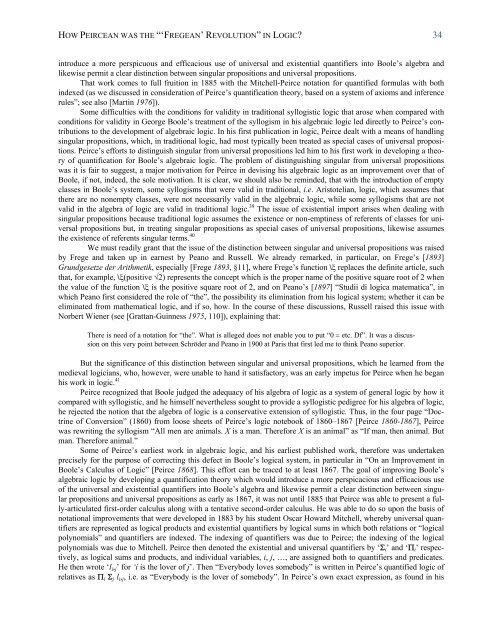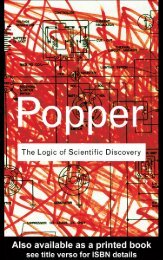You also want an ePaper? Increase the reach of your titles
YUMPU automatically turns print PDFs into web optimized ePapers that Google loves.
HOW PEIRCEAN WAS THE “‘FREGEAN’ REVOLUTION” IN LOGIC? 34<br />
introduce a more perspicuous and efficacious use of universal and existential quantifiers into Boole’s algebra and<br />
likewise permit a clear distinction between singular propositions and universal propositions.<br />
That work comes to full fruition in 1885 with the Mitchell-Peirce notation for quantified formulas with both<br />
indexed (as we discussed in consideration of Peirce’s quantification theory, based on a system of axioms and inference<br />
rules”; see also [Martin 1976]).<br />
Some difficulties with the conditions for validity in traditional syllogistic logic that arose when compared with<br />
conditions for validity in George Boole’s treatment of the syllogism in his algebraic logic led directly to Peirce’s contributions<br />
to the development of algebraic logic. In his first publication in logic, Peirce dealt with a means of handling<br />
singular propositions, which, in traditional logic, had most typically been treated as special cases of universal propositions.<br />
Peirce’s efforts to distinguish singular from universal propositions led him to his first work in developing a theory<br />
of quantification for Boole’s algebraic logic. The problem of distinguishing singular from universal propositions<br />
was it is fair to suggest, a major motivation for Peirce in devising his algebraic logic as an improvement over that of<br />
Boole, if not, indeed, the sole motivation. It is clear, we should also be reminded, that with the introduction of empty<br />
classes in Boole’s system, some syllogisms that were valid in traditional, i.e. Aristotelian, logic, which assumes that<br />
there are no nonempty classes, were not necessarily valid in the algebraic logic, while some syllogisms that are not<br />
valid in the algebra of logic are valid in traditional logic. 39 The issue of existential import arises when dealing with<br />
singular propositions because traditional logic assumes the existence or non-emptiness of referents of classes for universal<br />
propositions but, in treating singular propositions as special cases of universal propositions, likewise assumes<br />
the existence of referents singular terms. 40<br />
We must readily grant that the issue of the distinction between singular and universal propositions was raised<br />
by Frege and taken up in earnest by Peano and Russell. We already remarked, in particular, on Frege’s [1893]<br />
Grundgesetze der Arithmetik, especially [Frege 1893, §11], where Frege’s function�\� replaces the definite article, such<br />
that, for example, \�(positive √2) represents the concept which is the proper name of the positive square root of 2 when<br />
the value of the function \� is the positive square root of 2, and on Peano’s [1897] “Studii di logica matematica”, in<br />
which Peano first considered the role of “the”, the possibility its elimination from his logical system; whether it can be<br />
eliminated from mathematical logic, and if so, how. In the course of these discussions, Russell raised this issue with<br />
Norbert Wiener (see [Grattan-Guinness 1975, 110]), explaining that:<br />
There is need of a notation for “the”. What is alleged does not enable you to put “��� etc. Df”. It was a discussion<br />
on this very point between Schröder and Peano in 1900 at Paris that first led me to think Peano superior.<br />
But the significance of this distinction between singular and universal propositions, which he learned from the<br />
medieval logicians, who, however, were unable to hand it satisfactory, was an early impetus for Peirce when he began<br />
his work in logic. 41<br />
Peirce recognized that Boole judged the adequacy of his algebra of logic as a system of general logic by how it<br />
compared with syllogistic, and he himself nevertheless sought to provide a syllogistic pedigree for his algebra of logic,<br />
he rejected the notion that the algebra of logic is a conservative extension of syllogistic. Thus, in the four page “Doctrine<br />
of Conversion” (1860) from loose sheets of Peirce’s logic notebook of 1860–1867 [Peirce 1860-1867], Peirce<br />
was rewriting the syllogism “All men are animals. X is a man. Therefore X is an animal” as “If man, then animal. But<br />
man. Therefore animal.”<br />
Some of Peirce’s earliest work in algebraic logic, and his earliest published work, therefore was undertaken<br />
precisely for the purpose of correcting this defect in Boole’s logical system, in particular in “On an Improvement in<br />
Boole’s Calculus of Logic” [Peirce 1868]. This effort can be traced to at least 1867. The goal of improving Boole’s<br />
algebraic logic by developing a quantification theory which would introduce a more perspicacious and efficacious use<br />
of the universal and existential quantifiers into Boole’s algebra and likewise permit a clear distinction between singular<br />
propositions and universal propositions as early as 1867, it was not until 1885 that Peirce was able to present a fully-articulated<br />
first-order calculus along with a tentative second-order calculus. He was able to do so upon the basis of<br />
notational improvements that were developed in 1883 by his student Oscar Howard Mitchell, whereby universal quantifiers<br />
are represented as logical products and existential quantifiers by logical sums in which both relations or “logical<br />
polynomials” and quantifiers are indexed. The indexing of quantifiers was due to Peirce; the indexing of the logical<br />
polynomials was due to Mitchell. Peirce then denoted the existential and universal quantifiers by ‘�i’ and ‘�i’ respectively,<br />
as logical sums and products, and individual variables, i, j, …, are assigned both to quantifiers and predicates.<br />
He then wrote ‘li,j’ for ‘i is the lover of j’. Then “Everybody loves somebody” is written in Peirce’s quantified logic of<br />
relatives as �i �j li,j, i.e. as “Everybody is the lover of somebody”. In Peirce’s own exact expression, as found in his





